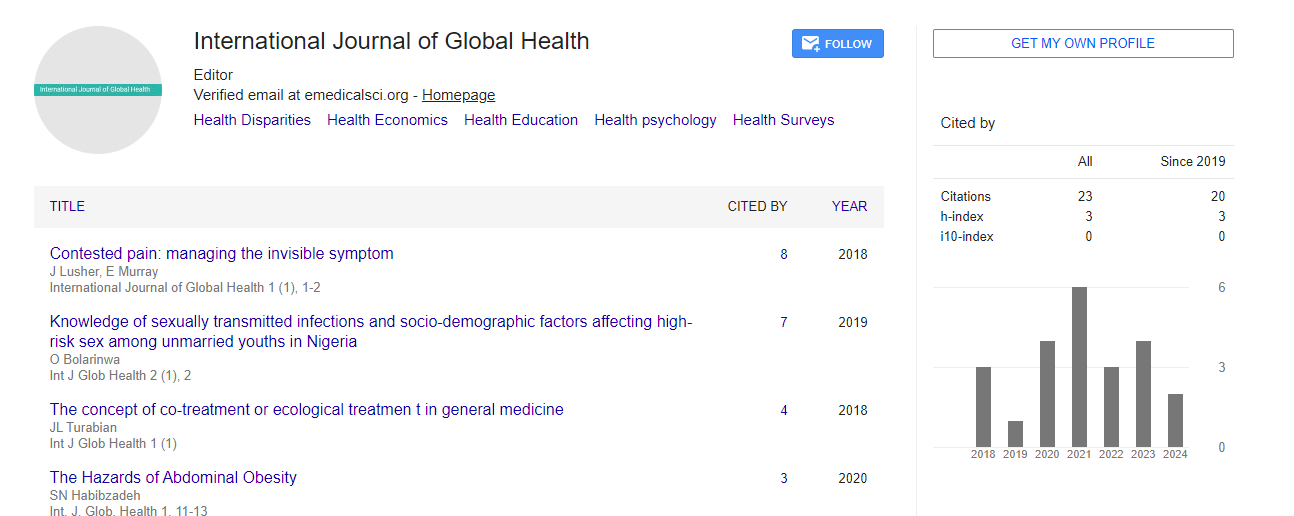Editorial, Int J Glob Health Vol: 4 Issue: 3
A Short note on Health psychology
Kristin Holmes*
Healthy City Research Center, Yonsei University, Wonju, Korea
- *Corresponding Author:
- Kristin Holmes
Healthy City Research Center, Yonsei University, Wonju, Korea
E-mail: krsitn@hotmail.com
Received Date: May 07, 2021; Accepted Date: May 14, 2021; Published Date: May 21, 2021
Citation: Holmes K (2021) A Short note on Health psychology. Int J Glob Health 4:3. 133.
Copyright: © All articles published in International Journal of Global Health are the property of SciTechnol, and is protected by copyright laws. Copyright © 2021, SciTechnol, All Rights Reserved.
Abstract
Health psychology is that the study of psychological and behavioral processes in health, illness, and healthcare. it’s concerned with understanding how psychological, behavioral, and cultural factors contribute to physical health and illness. Psychological factors can affect health directly. for instance , chronically occurring environmental stressors affecting the hypothalamic–pituitary– adrenal axis, cumulatively, can harm health. Behavioral factors also can affect an individual’s health. for instance , certain behaviors can, over time, harm (smoking or consuming excessive amounts of alcohol) or enhance health (engaging in exercise). Health psychologists take a biopsychosocial approach. In other words, health psychologists understand health to be the merchandise not only of biological processes (e.g., a virus, tumor, etc.) but also of psychological (e.g., thoughts and beliefs), behavioral (e.g., habits), and social processes (e.g., socioeconomic status and ethnicity).
Keywords: hypothalamic, pituitary, adrenal axis
By understanding psychological factors that influence health, and constructively applying that knowledge, health psychologists can improve health by working directly with individual patients or indirectly in large-scale public health programs. additionally , health psychologists can help train other healthcare professionals (e.g., physicians and nurses) to use the knowledge the discipline has generated, when treating patients. Health psychologists add a spread of settings: alongside other medical professionals in hospitals and clinics, publicly health departments performing on large-scale behavior change and health promotion programs, and in universities and medical schools where they teach and conduct research.
Although its early beginnings are often traced to the sector of psychotherapy, four different divisions within health psychology and one related field, occupational health psychology (OHP), have developed over time. The four divisions include clinical health psychology, public health psychology, community health psychology, and important health psychology. Professional organizations for the sector of health psychology include Division 38 of the American Psychological Association (APA), the Division of Health Psychology of British Psychological Society (BPS), the ecu Health Psychology Society, and therefore the College of Health Psychologists of the Australian Psychological Society (APS). Advanced credentialing within the US as a clinical health psychologist is provided through the American Board of Professional Psychology.
Recent advances in psychological, medical, and physiological research have led to a replacement way of brooding about health and illness. This conceptualization, which has been labeled the biopsychosocial model, views health and illness because the product of a mixture of things including biological characteristics (e.g., genetic predisposition), behavioral factors (e.g., lifestyle, stress, health beliefs), and social conditions (e.g., cultural influences, family relationships, social support).
Psychologists who strive to know how biological, behavioral, and social factors influence health and illness are called health psychologists. Health psychologists use their knowledge of psychology and health to market general well-being and understand physical illness. they’re specially trained to assist people affect the psychological and emotional aspects of health and illness. Health psychologists work with many various health care professionals (e.g., physicians, dentists, nurses, physician’s assistants, dietitians, social workers, pharmacists, physical and occupational therapists, and chaplains) to conduct research and supply clinical assessments and treatment services. Many health psychologists specialise in prevention research and interventions designed to market healthier lifestyles and check out to seek out ways to encourage people to enhance their health. for instance, they’ll help people to reduce or stop smoking. Health psychologists also use their skills to undertake to enhance the healthcare system. for instance , they’ll advise doctors about better ways to speak with their patients. Health psychologists add many various settings including the UK’s National Health Service (NHS), private practice, universities, communities, schools and organizations. While many health psychologists provide clinical services as a part of their duties, others function in non-clinical roles, primarily involving teaching and research. Leading journals include Health Psychology, the Journal of Health Psychology, British Journal of Health Psychology, and Applied Psychology: Health and Well-Being. Health psychologists can work with people on a one-to-one basis, in groups, as a family, or at a bigger population level.
 Spanish
Spanish  Chinese
Chinese  Russian
Russian  German
German  French
French  Japanese
Japanese  Portuguese
Portuguese  Hindi
Hindi 
